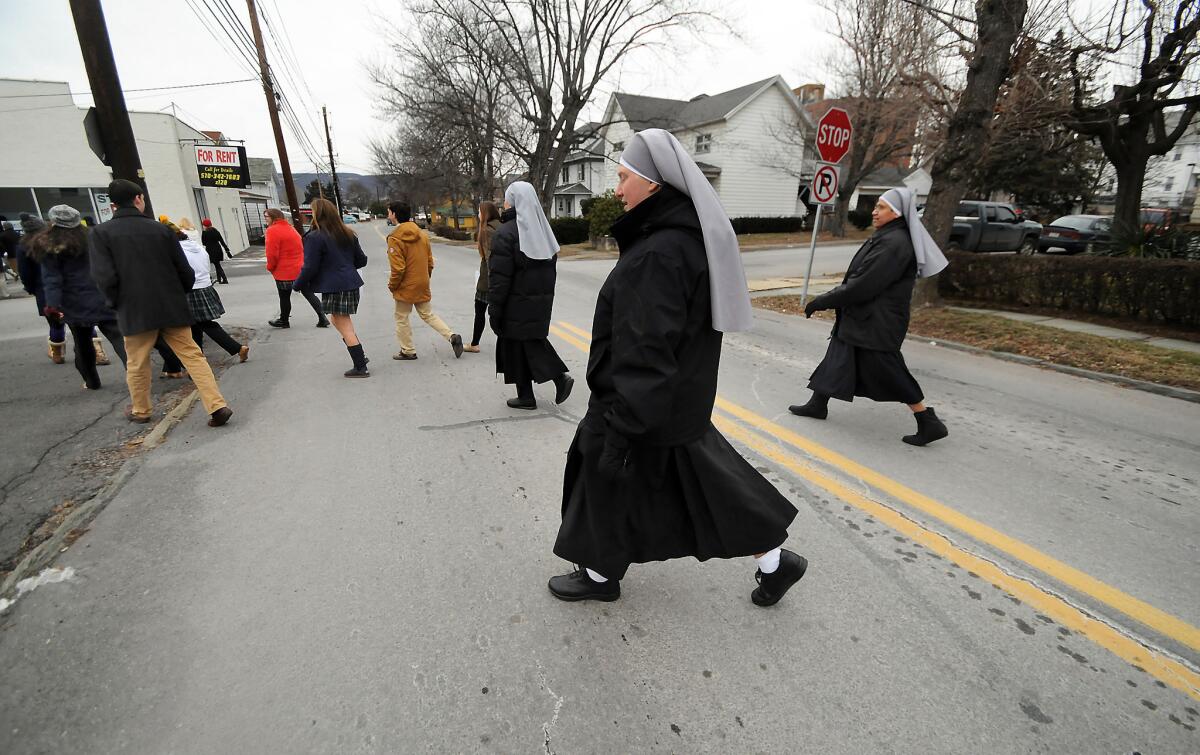Editorial: Birth control and Obamacare are on trial yet again in the Supreme Court

Nuns from Little Sisters of the Poor, based in Scranton, Pa., take part in a “March For Life” walk held on Jan. 22 in Dunmore, Pa.
- Share via
On Wednesday, the Supreme Court will hear arguments in yet another challenge to the implementation of the 2010 Patient Protection and Affordable Care Act, better known as Obamacare. Although the legal issues are complex, the case of Zubik vs. Burwell can be summed up in an old saying: “No good deed goes unpunished.” The good deed in this case is the Obama administration’s decision to accommodate religiously affiliated employers who believe birth control to be immoral.
Under regulations promulgated to enforce the ACA, health insurance plans must cover — with no out-of-pocket costs — certain preventive health services for women, including all doctor-prescribed contraceptives approved by the Food and Drug Administration. But, recognizing that some religious groups oppose birth control, the administration made two concessions.
Churches and other houses of worship are completely exempted from the contraceptive requirement, while religious social-service agencies — which employ people of many and no religious beliefs — have been spared from financing contraceptives themselves. Instead, all they must do is inform the government or their insurer that they have religious objections to providing contraception coverage. The cost of birth-control coverage would then be assumed by the insurance company or the third-party administrator.
What makes this dispute particularly intense is that some opponents believe the mandate extends to drugs that effectively cause an abortion. Supporters of the mandate disagree, noting that the “morning after pill” and similar emergency contraceptives do not work on women who have become pregnant.
The accommodation being offered the religious nonprofits is a generous compromise. In fact, the Supreme Court cited it approvingly in its 2014 decision granting a similar arrangement to Hobby Lobby and other “closely held” for profit companies. Writing for the court, Justice Samuel A. Alito Jr. noted that “HHS has already devised and implemented a system that seeks to respect the religious liberty of religious nonprofit corporations while ensuring that the employees of these entities have precisely the same access to all FDA-approved contraceptives as employees of companies whose owners have no religious objections to providing such coverage.”
The accommodation being offered the religious nonprofits is a generous compromise.
But that’s not good enough for the plaintiffs here, who include the Little Sisters of the Poor Home for the Aged. Even filling out an exemption form is too much for them, they argue, because it authorizes insurers to do what they won’t do — supply women with contraceptives — which amounts to “taking actions that violate their sincerely held religious beliefs.”
That, they say, violates their rights under the Religious Freedom Restoration Act of 1993, a law passed by Congress to protect religious freedom over and above what the Supreme Court had held that the 1st Amendment guarantees. Under the law, a “person” — later interpreted by the court to include some for-profit corporations — may be exempted from laws that “substantially burden” the free exercise of religion. In such cases, the government can compel compliance only if the law furthers a “compelling governmental interest” and is the “least restrictive means” of furthering that interest.
Providing comprehensive preventive health care to women is obviously a compelling interest, but the plaintiffs try to cast doubt on that fact by noting that houses of worship are totally exempt from the contraceptive mandate, as are some insurance plans that predate the Affordable Care Act. If the government is willing to make these exceptions, they argue, the interest must not be compelling. That’s a perverse argument that treats the concession to houses of worship — which tend mostly to employ members of the faith — as proof that contraceptive coverage for women isn’t important.
The plaintiffs make another argument: that they can decide for themselves whether signing a paper constitutes a “substantial burden.” As they say in their brief: “If a religious adherent sincerely believes that taking a particular action would make him complicit in the sin of another, then courts must defer to that belief.” This turns the Religious Freedom Restoration Act into a blank check.
Finally, the plaintiffs suggest that the accommodation offered by the government is not the “least restrictive means” because there are other ways to accomplish that objective, such as by having the government provide a refundable tax credit for contraceptives. But there is no guarantee that Congress would ever approve such a plan.
The Religious Freedom Restoration Act was a noble attempt to provide additional breathing room for religious freedom, and it was enacted with bipartisan support. But the plaintiffs’ interpretation of the law is extreme and unpersuasive. Were the court to accept it, Congress would have good reason to consider revising the statute or even repealing it.
Follow the Opinion section on Twitter @latimesopinion and Facebook
A cure for the common opinion
Get thought-provoking perspectives with our weekly newsletter.
You may occasionally receive promotional content from the Los Angeles Times.






